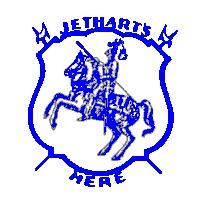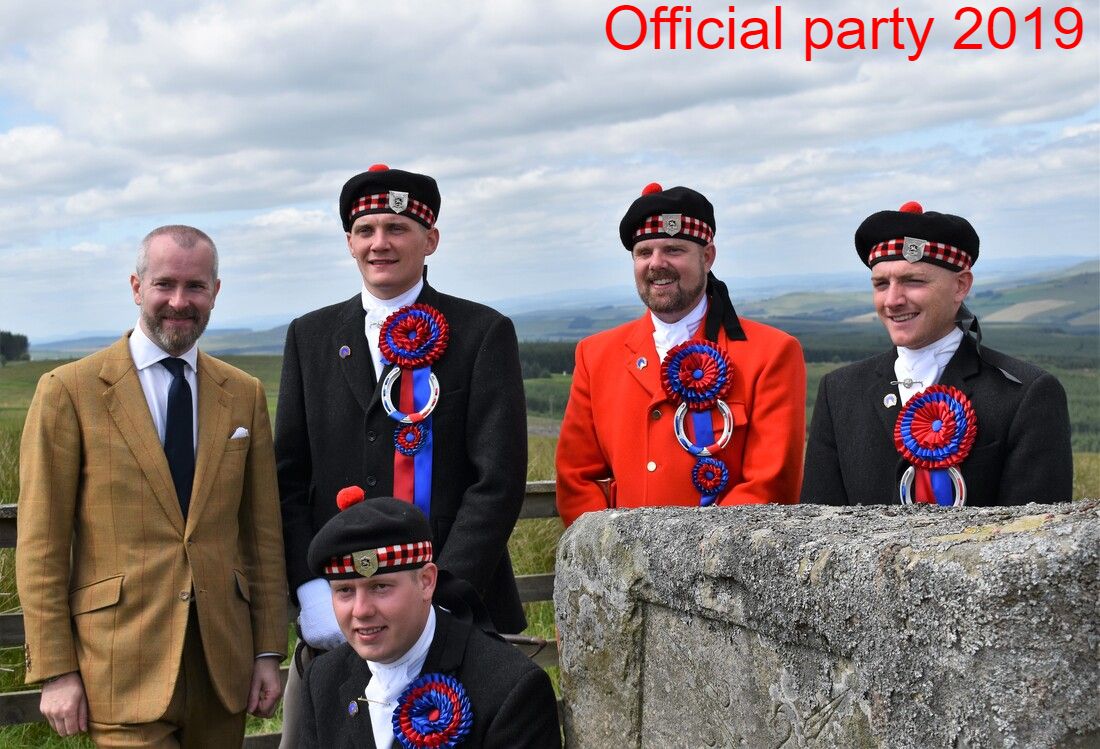The Raid of Redeswire - 1575
On the seventh day of July, 1575, the peace of the Borders was disturbed by an affray in which the townsmen of Jedburgh played a prominent part. A hill near "Carter Bar" on the limits of the two kingdoms was agreed on as the trysting place of Sir John Foster, warden of the middle marches of England, and Sir John Carmichael, deputy warden of the middle marches of Scotland and keeper of Liddesdale, for the redress of their subjects grievances. It was usual on such occasions for a great many people of both nations to assemble. Most of them had some interest in the proceedings in which both their friends and enemies were concerned and naturally felt anxious as to the outcome of the meeting.
Others attended simply to satisfy their curiosity or for entertainment. Many also attended for the purpose of trade and social intercourse. A convenient place was chosen on English ground for holding the Court of justice where the wardens proceeded to hear complaints, determine their causes and impose punishment.
The case of an English freebooter, Henry Robson by name, that had been adjourned from a previous meeting, was called. Representation was made that owing to illness he was unable to be present to defend his cause, but as this plea could not be confirmed on oath the English warden condemned the party by default. Carmichael, believing that Foster was screening Robson from justice, demanded that the criminal should be delivered up to him. The English warden resentfully replied and a heated argument followed. This same attitude was taken up by their followers. They also began to express rudely their displeasure with each other, with the result that the men of Tynedale began to shoot their arrows into the midst of the Scots although the English blamed the Scots for shooting the first arrow. A few of the English,however, who loved booty more than blows began to upset and plunder the "Krames" of the Scots. One of these pedlars belonging to Jedburgh raised the old war cry " A Jedworth, A Jedworth ", while the English replied with "FY Tyndaill, Fy Tyndaill". The fight was on.
The men of Liddesdale seized their opponent's horses that were grazing close by while the men of Tynedale siezed those of the Scots. The remainder of the assembly joined the
affray, each clan singling out its enemies on the other side. The wardens tried in vain to stop the pillage and fighting but their followers would not be pacified.
At first the Scots had the worst of it and were being driven in disorder over the scots side of the hill. They were met by the craftsmen of Jedburgh led by their Provost and Magistrates who came, as was their custom, with drums beating and banners flying, and battle cry of "Jethart's Here " to support the warden. Thus reinforced, the fleeing Scots reformed their ranks, returned to the fray, and after a struggle put their enemies to flight. The now victorious Scots persued them into England taking many prisoners, among whom were Sir John Foster, Francis Russel and Sir Cuthbert Collingwood. They were taken to the Scottish Regent in Dalkeith who imprisoned them for a few days to give them time to recover their tempers before setting them free. Carmichael at the request of the English Parliament was sent to York where he was detained for a few weeks, When it was proved that he was not to blame for the Reidswire skirmish he was liberated and presented with gifts and marks of approbation. This encounter is usually know by the name of "The Raid of the Reidswire" and is the last of any note that took place between the two kingdoms.
"Bauld Rutherford he was fou stout
Wi' a' his nine sons him round about
He led the town o' Jedburgh out
All bravely fought that day "
It is believed that this was the last time that the bow and arrow was used as a fighting weapon in this country.
Others attended simply to satisfy their curiosity or for entertainment. Many also attended for the purpose of trade and social intercourse. A convenient place was chosen on English ground for holding the Court of justice where the wardens proceeded to hear complaints, determine their causes and impose punishment.
The case of an English freebooter, Henry Robson by name, that had been adjourned from a previous meeting, was called. Representation was made that owing to illness he was unable to be present to defend his cause, but as this plea could not be confirmed on oath the English warden condemned the party by default. Carmichael, believing that Foster was screening Robson from justice, demanded that the criminal should be delivered up to him. The English warden resentfully replied and a heated argument followed. This same attitude was taken up by their followers. They also began to express rudely their displeasure with each other, with the result that the men of Tynedale began to shoot their arrows into the midst of the Scots although the English blamed the Scots for shooting the first arrow. A few of the English,however, who loved booty more than blows began to upset and plunder the "Krames" of the Scots. One of these pedlars belonging to Jedburgh raised the old war cry " A Jedworth, A Jedworth ", while the English replied with "FY Tyndaill, Fy Tyndaill". The fight was on.
The men of Liddesdale seized their opponent's horses that were grazing close by while the men of Tynedale siezed those of the Scots. The remainder of the assembly joined the
affray, each clan singling out its enemies on the other side. The wardens tried in vain to stop the pillage and fighting but their followers would not be pacified.
At first the Scots had the worst of it and were being driven in disorder over the scots side of the hill. They were met by the craftsmen of Jedburgh led by their Provost and Magistrates who came, as was their custom, with drums beating and banners flying, and battle cry of "Jethart's Here " to support the warden. Thus reinforced, the fleeing Scots reformed their ranks, returned to the fray, and after a struggle put their enemies to flight. The now victorious Scots persued them into England taking many prisoners, among whom were Sir John Foster, Francis Russel and Sir Cuthbert Collingwood. They were taken to the Scottish Regent in Dalkeith who imprisoned them for a few days to give them time to recover their tempers before setting them free. Carmichael at the request of the English Parliament was sent to York where he was detained for a few weeks, When it was proved that he was not to blame for the Reidswire skirmish he was liberated and presented with gifts and marks of approbation. This encounter is usually know by the name of "The Raid of the Reidswire" and is the last of any note that took place between the two kingdoms.
"Bauld Rutherford he was fou stout
Wi' a' his nine sons him round about
He led the town o' Jedburgh out
All bravely fought that day "
It is believed that this was the last time that the bow and arrow was used as a fighting weapon in this country.

